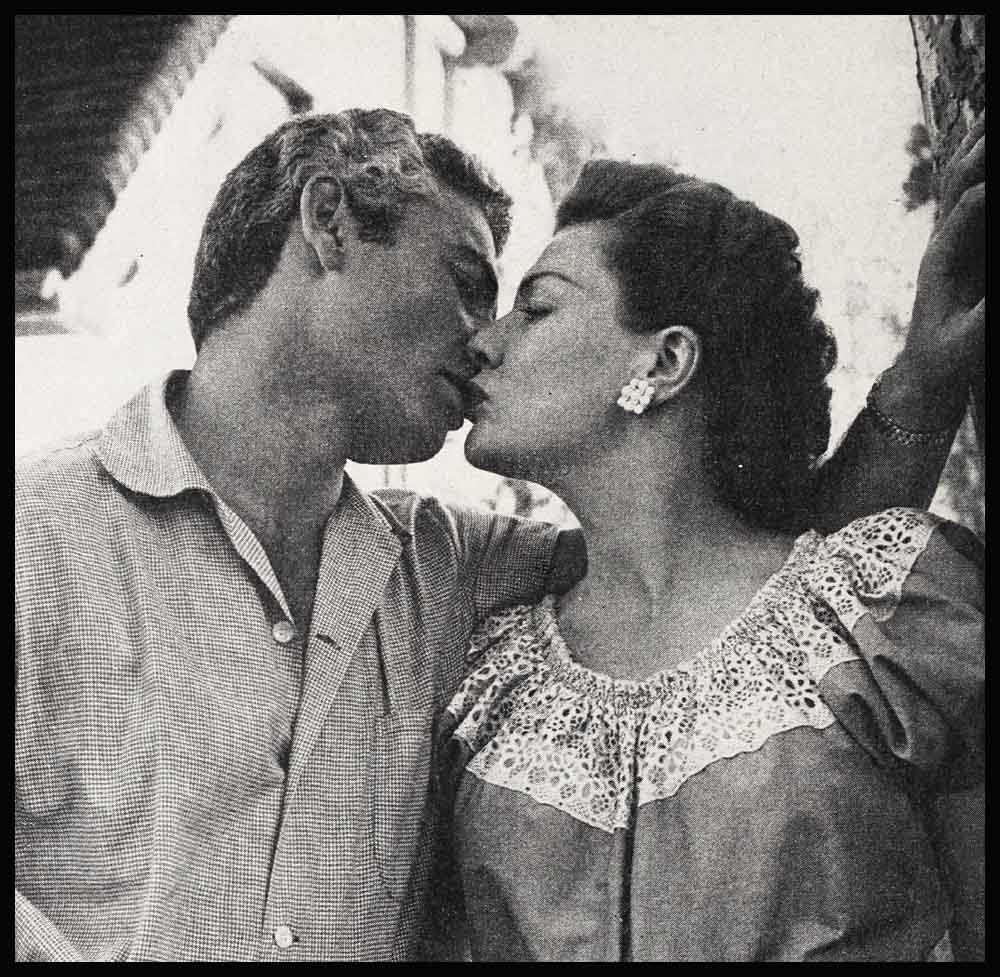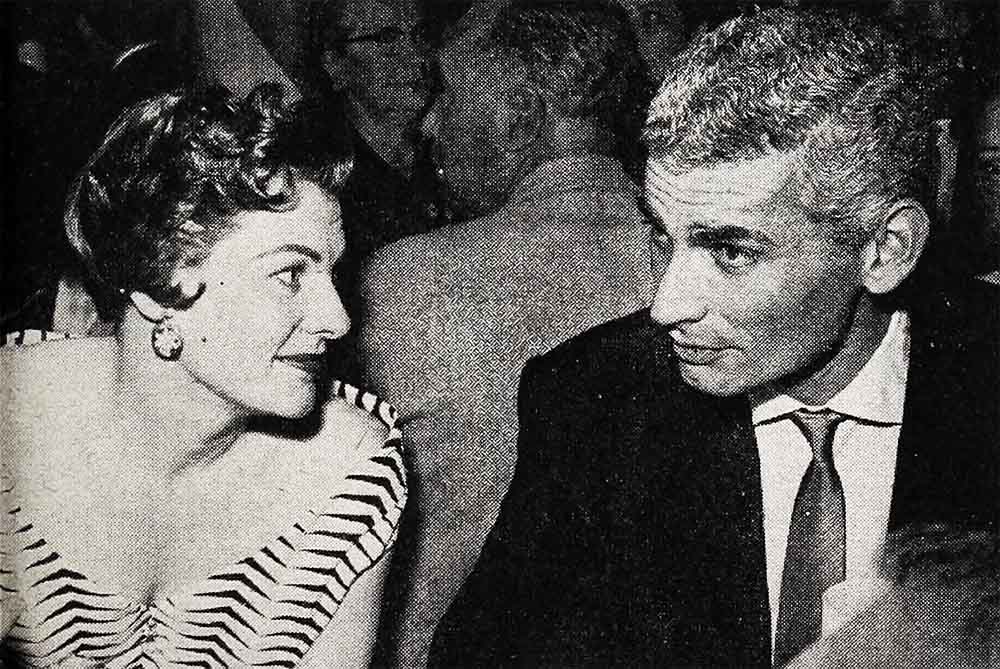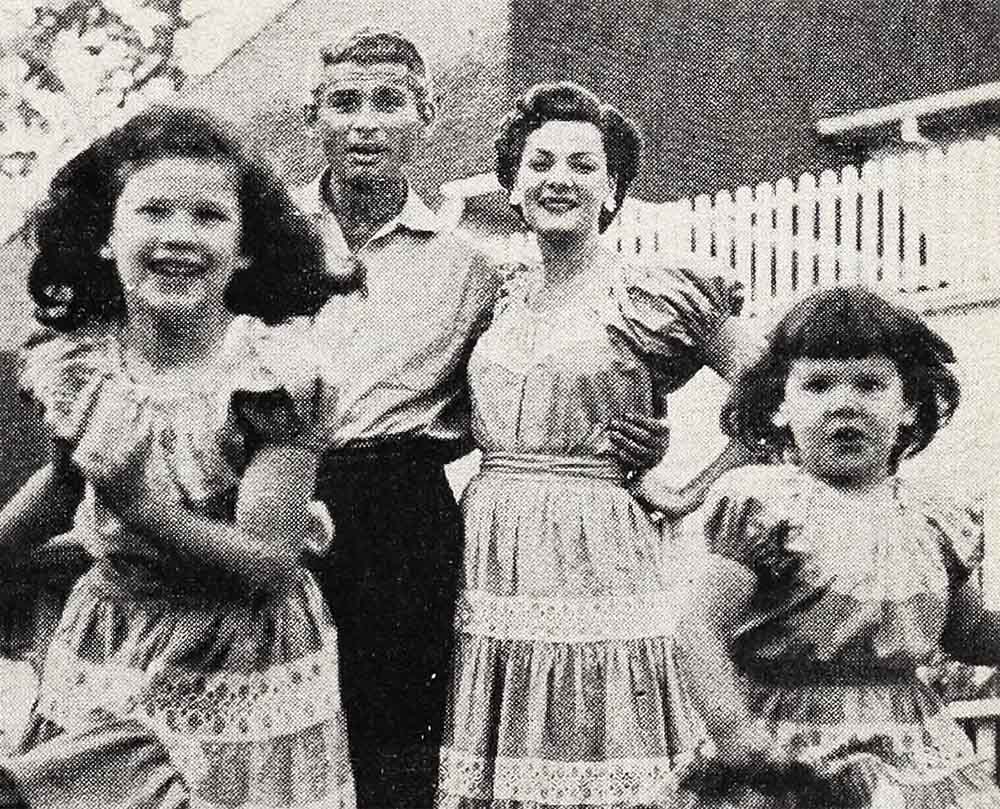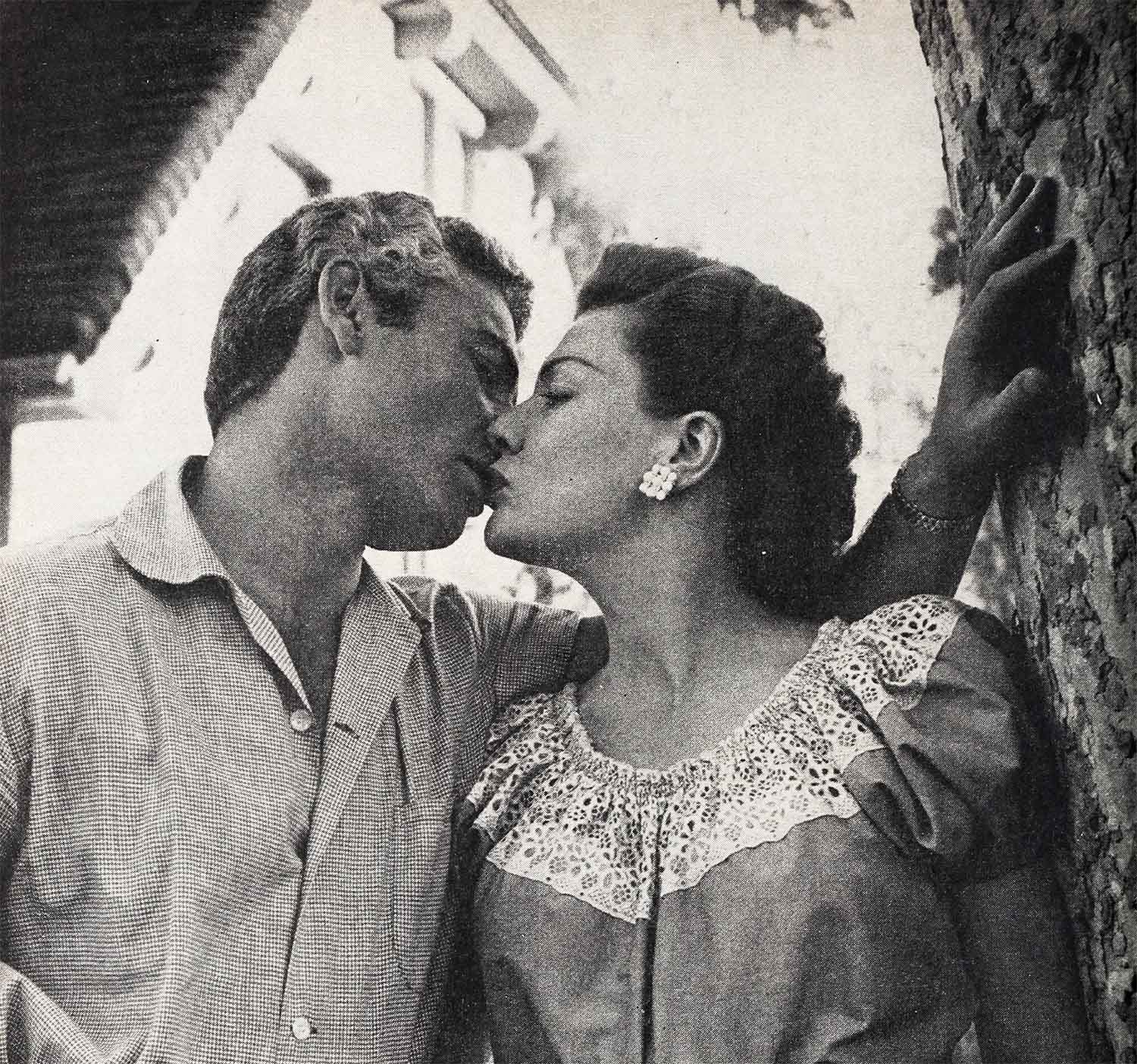
They Kissed And Made Up
“I’ll be loving you—always . . .” Jeff Chandler sang across a crowded room, straight into the eyes of a girl whose radiance gave her own heart away. A lovely redhead named. naturally, Marge.
All of show business was taking a nostalgic turn at the mike of the Mocambo. Tonight Jeff Chandler was heading the show. But for these two, Jeff and Marge, it was more than a show; more than a song. It was a pledge as sacred in its way as those wedding vows they had already twice exchanged in good faith.
Jeff sang to the twinkling accompaniment of a kingdom of lights below, a kingdom founded on love stories. And although they did not know it, the crowd was applauding the happy ending of another love story that had as many conflicts as any one Hollywood ever filmed. The love story of two fine people for whom even then, so many were saying a small prayer.
Sparked by his own happiness, Jeff’s was an inspired performance this night. But it was Marge who revealed, too, that for them this was more than just an enchanted evening. “You must be very proud of him tonight,” a friend remarked to her. “I certainly am proud of him.” Marge beamed, adding, quietly and significantly, “. . . and I always have been.”
Marge’s and Jeff’s reconciliation wasn’t as sudden as it may seem to outsiders. As Jeff says now, “We’d been talking about it for six weeks, seeing each other, going out together—and talking. That night at the Mocambo, we just about knew then. . .
“We think—we know—this time it’s going to stick,” he says slowly, savoring every word. “This is going to be it.” And he adds quite unnecessarily, “We’re both very happy now.”
Happy? You could set lyrics to Jeff’s voice today and to Marge’s radiance. But then, they were still in love when they separated a year and a half ago. When they gave Photoplay’s reporter their exclusive story, saying with sad resignation, “It just seems there’s no other way.”
Marge had one concern about talking then. “You must talk to Jeff. You really should talk to Jeff—”
Jeff had one concern. “Be sure Marge sees this.”
Perry Como’s record of a beautiful love song was sweeping the country. A song that summed them up so well that we included it in their story, “No Other Love Have I.” Certainly no other love had Jeff, and no other love had Marge. Nor was either ever likely to have.
Jeff was then on location way out in the San Fernando Valley making “Yankee Pasha” when we took the finished story to him to read. It was about sundown when we found him. Jeff was heavy-voiced and feeling very six o’clock. He looked at the title. He read their own words. Words which brought back too many vivid memories, including those of his daughter, Jamie, who asked the question neither of them could answer. “Daddy—why aren’t you living at home?” He turned and walked away. With the director. his costar and all the company waiting, Jeff Chandler cried. He had one parting word. “Marge will see this?” he said.
That night we took their story to Marge—to the house they’d shared on a quiet, tree-lined street in Hollywood. A house with all its lights blazing bravely away—to hide its emptiness. Marge looked at the story. “Jeff called me.” she said finally, “and told me about ‘No Other Love Have I.’ I went out and bought the record.”

This was a break-up?
How long. we wondered. would it take love to find the way to get our heavyhearted friend and this lovely, lonely girl in a house so ablaze with light—back together again?
It would take almost too long.
They were missing happiness together by so little—yet, seemingly, by too much
to bridge. As Jeff said sadly then, you could call theirs a near-miss. “That’s what it’s been really. We just couldn’t quite make it. But it’s been in many ways very near. And we have great rapport still—in so many things.”
Jeff was sure Marge would be happier without him. ‘I’m just not equipped to give Marge what she wants, to be what she wants as a person. What I have to offer just isn’t sufficient for what her happiness demands—temperamentally, personality-wise or emotionally. It’s like a baseball player trying to make the major league with bush-league qualifications. Fm just not right for her.”
Marge. on the other hand. was equally sure Jeff was happier living away from her. Being able to wrap himself in his work and his worries and silent moods—without feeling any need of sharing them with her. Now when he came to the house to see her and the children—they could talk like good friends. All the tension was gone. “Jeff’s much happier this way I’m sure.
And Marge summed up not only their own feelings. but those of all who know them with, “It’s the saddest thing in the world. Two people who are in love with each other—but who still can’t live together.” Also. we thought. two who belonged together as few in this world ever do. two whose love had already survived so much—and two who still loved so much.
There was no third party involved. For either of them. During the months they were separated. both of them dated casually. Jeff’s name was linked with various screen glamour girls, and more recently, with Betty Abbott, Universal-International script girl. But theirs was never a romance, contrary to rumor. Betty, warm, witty and intelligent, was a trusted and faithful friend, helping see Jeff through a troubled time.
Nor, contrary to opinions of the ill-in formed, was there ever any dissension between Jeff and Marge over Marge’s having a career. The truth of the matter is that as talented an actress as she is, after their marriage, Marge’s career couldn’t have mattered less to her. Her husband, her family and her home were career enough, she said. After their separation, Marge was determined to restimulate her interest in a career to have some goal, to give life more purpose. There was no need for money, certainly. Jeff provided amply, and the terms of their settlement gave Marge $47,000 a year. But as she has said, “Now I would like to work. I never thought of resuming my career as long as there were more important interests, but now I’d like to get into television or perhaps the theatre. It’s up to me to restimulate the drive, the push for a career.’ During the past months Marge has appeared in several TV shows. Her agent is also Jeff’s agent, Meyer Mishkin, who’s equally devoted to both of them and with whom Jeff has shared an office in Beverly Hills for some time. Just the day before their reconciliation was announced officially, Marge was at Warner Brothers discussing an important role in “Rebel without a Cause,” starring James Dean.

As she’s said, “Jeff has never objected to my having a career.” And as Jeff’s said, “I’ve wanted Marge to work more than she has wanted to. But she felt she had another career. And during the years her drive diminished.” İn a happier day he used to say laughingly, “I’d love for her to work in pictures—if only to understand how hard I work.”
Basically, their difficulties have stemmed from the same situation prevalent in hundreds of other homes throughout the land, involving he who works and she who stays home. But their situation was intensified by deep and opposing insecurities. To Marge, love has always meant interdependence and her happiness has been dependent on him. Jeff’s security lay in large part in his job.
Just how much Jeff’s happiness depended upon her, just how much he needed her, for all his recurrent moods and silence, Marge probably would not have believed then. As a close friend of Jeff’s recalls now, “I was with him the day Marge finally entered the decree. He was busted-up, a really upset, a very depressed man.
After their separation, it was Marge herself who put a wise and intuitive finger on the source of much of their trouble—even though she felt they had gone beyond the answers then. Both come from divided homes. Jeff’s parents separated when he was three. He grew up in Flat-bush surrounded by poverty. His mother worked as a manicurist and did other odd jobs to support them. He worked before and after school. He knew poverty, but he also knew love. He had his mother’s love and that of adoring grandparents who helped raise him besides. His grandfather, a Russian immigrant, brought his family to America where they could have more opportunities. In this wonderland, he would tell a wide-eyed Jeff, you could be whatever you willed to be. Anything could happen. The tallest dream could come true. And from childhood, Jeff enveloped himself in his own tall and beautiful dream—to be an actor. He was ever dedicated to this dream. Undiscouraged by the lean and defeating years when he beat on doors that wouldn’t open for him, he was determined to work all the harder—when finally they did open.
Marge never knew hunger or poverty but from childhood she knew a lack of love. Hers was a lonelier childhood, followed by years in boarding schools. She has had an emotional need for reassurrance and a great outward expression of love. And as she’s said, “Jeff always knew a lot of love but he was very conscious from childhood of the need for financial security and his job meant a great deal to him.
“Perhaps,” Marge would say, “if I’d been more self-sufficient, as many women apparently can be. Perhaps if I’d been a person who could be absorbed in a career of my own or in other outside interests-then I might be an easier person for Jeff to live with. Perhaps, if I hadn’t been so dependent on him—”
Perhaps, Jeff would muse in turn, if as his career developed he hadn’t had the tendency “to tie myself up inside and not give as much as I might have” of himself to his home and the interests there.

Perhaps if they hadn’t once been so happy together. As Marge put it aptly, they aren’t “casual people.” They just couldn’t go on with the shell of the happiness they had once known together. The happiness still too well-remembered to settle for less.
In the past year and a half they’ve both had lonely hours to weigh and remember and wonder if perhaps. . . .
But to anxious friends counting the days remaining before their divorce became final, it seemed impossible this marriage could die this way. After all, it had weathered efficiency apartments with pull-down beds, had survived scrimping and budgeting and illness and all the frustrating days when Jeff couldn’t get inside a studio, and had survived a painful seven-month separation.
They had been so happy when they reconciled before. And Jeff had given domestic projects the full college try. He made himself a workroom and became engrossed in the manufacture of various things for their new home. No more feverish goals for him, he insisted then. He was going to enjoy life without rushing it But fame had already more than caught up with him. He was star-high at the box-office and the studio rushed him into picture after picture and with characteristic concentration, Jeff became more involved.
As he says now of his tendency to work so wholeheartedly, “There’s got to be a limit to that.” And his tone affirms that from this day forward, there’s going to be a new Jeff around home and Hollywood.
During the months they were separated he worked harder than he’s ever worked before. Their increasing unhappiness apart was evident to many who knew them. Marge tried to rekindle enthusiasm for her own career. She kept busy with “Share, Incorporated,” a club composed of movie wives who concentrate on neglected charities. She talked of traveling, and she began studying French. Jeff added new laurels as a Decca recording artist and song writer. He was on the move constantly. He took an apartment on Wilshire Boulevard. Then he decided to live in his dressing room on the studio lot. Then, restlessly, he moved again. This time to a one-bedroom furnished apartment not too far from the studio.
But throughout their separation, Jeff and Marge were closer than many knew. As she said in the beginning, “As Holly wood as this sounds, we’re still good friends.” She was as ready as ever with an encouraging word and all enthusiasm about his talent as a vocalist. When he was cast in “Foxfire,” Marge rushed out immediately and bought the book.
And Jeff was a constant visitor in her home. As his mother says now, “Jeff was there every day or evening to see the children—or he would telephone. When he was on location in the East, he called long-distance every night and talked to the three of them. The children and Marge. He was always concerned about them.”
Holidays were the heart breakers for both of them, but these too they shared in part. On Christmas Jeff loaded the car with gifts for their tree. On Thanksgiving Marge took the children by to see him, and just bow much the three of them meant to Jeff was in his face and his misting eyes when they drove away.
Coming from divided homes as they themselves had, Marge and Jeff were doubly concerned that Jamie, 7, and Dana, 5, would have all the love and attention they both could give. Happy-go-lucky Dana took the whole situation in stride. But Jamie’s blue eyes were puzzled. She couldn’t understand why her father didn’t live at home any more. As for Jeff—how can you tell a child why?
Nor, as time went by, could Jeff or Marge tell themselves why. They were separated nine months before Marge filed for divorce and, as the day neared when the decree would become final, they must have known this just could not be. That neither of them could cut the final tie. Pride and any stubbornness and past difficulties diminished to true size.
Love finally found the way—and just in time just a month before the final decree.
But as Jeff says now, they’d been talking toward it for over six weeks before they finally reconciled. From their first appearance together—when Jeff took Marge to Ciro’s to see Sammy Davis, Jr.—they went out in public together various times. Their increasing happiness was pretty apparent.
As a close friend of Jeff’s observes, During this time Jeff was working on ‘The Spoilers,’ and doing added scenes on ‘Female on the Beach,’ as well as preparing for his next one, ‘Away all Boats.’ All this, in addition to working up his Las Vegas act for the Riviera Hotel—following Liberace. But in spite of tremendous pressures, he was able to handle it all and was happy about it. I can only think he was happy because he was preparing for their reconciliation. I wasn’t surprised at all by it. I think the past year has been very beneficial to both of them.”
Jeff heartily agrees. “We were missing somewhere before,” he says slowly now. “I think the time we spent apart has given us each an opportunity to brush up. To learn more about ourselves and about each other. We’re more cognizant now, of many things. We’ve both learned and we’re more aware. Just say we’ve grown up a little bit. That may sound a little juvenile,” he says, weighing the words, “but—that’s the way it is.”
And you can grow until you die. And so can love and understanding between two like Jeff and Marge.
Jeff’s mother mirrored the thoughts of all who know them saying, “They belong together, these two. We’re all so happy about it. And I’m overjoyed.”
Contrary to the rumor that they would have another wedding for sentimental reasons, Jeff was quick to say, “No, I don’t think so. We’re married now.” Of this there seems no doubt. They’re well-married now.
They had three weeks for another honeymoon before Jeff was due to leave for the Caribbean on location for “Away All Boats.” They spent part of it with the whole New York Giants baseball team chaperoning them. They were the house guests of the Leo Durochers in Phoenix and traveled on with the team to Las Vegas and back to Los Angeles again. It took most of the remaining time to move Jeff into Marge’s house in West Los Angeles. But there’s no longer any reason to anxiously count the hours. They have the rest of their lives now.
There’s a gracious home in a lovely picturesque neighborhood. A modified Mediterranean house with dark “Chandler green” shutters, a red brick fireplace and a lacy balcony running the length of the second floor.
As Jeff says now, “It’s a beautiful house. And the location’s fine. I can go right over the canyon to the studio. But there’s just not enough closet space for my things. We’re either going to have to build in more closets or find a new house,” he says in a comfortably relaxed tone, which indicates that at this happy moment it doesn’t matter which.
And he adds, “It’s a wonderful feeling that exists between us now. This is it. I don’t want to analyze it. We’re not doing any more analyzing now. We’ve done a lot of that already. We figure we’re lucky enough to still have love, and we’re going to hold onto it this time!”
Perhaps it had to happen this way, Perhaps Marge and Jeff had to face a future without each other—to realize how much they’ve had. Perhaps they had to come within a whisper of losing each other forever to find each other again.
But they know now, Jeff and Marge, that theirs was only an interrupted melody.
THE END
It is a quote. PHOTOPLAY MAGAZINE JUNE 1955




